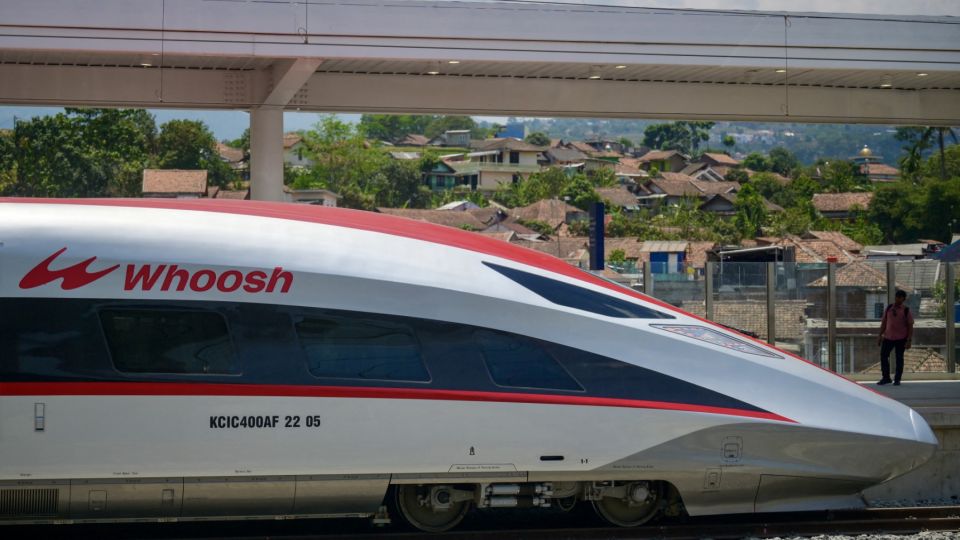November 6, 2025
JAKARTA – President Prabowo Subianto has insisted that responsibility for the debt incurred by the Jakarta-Bandung high-speed railway, dubbed Whoosh, ultimately lies with him, as the government considers covering its loans using the state budget.
“I’m now responsible for Whoosh,” the President said at the launch of the new Tanah Abang train station on Tuesday, emphasizing that public transportation should not be judged by its financial losses but by the benefits it brings to the people.
“There’s no problem, because we pay [the debt amounting to] Rp 1.2 trillion [US$71.81 million] annually. The benefits, such as reduced traffic, less pollution and faster travel, must all be taken into account,” he said.
Prabowo described railway projects as part of the public service obligation (PSO), in which the government subsidizes 60 percent of the cost while the public covers 20 percent. He added that if the administration continues to crack down on corruption, there would be “sufficient funds available” to serve the people, including to cover Whoosh’s debts.
“The money comes from the people, from taxes and the nation’s wealth. Therefore, we must prevent any leakage. We must put an end to abuse and corruption. The people’s money cannot be stolen and we will ensure that public services are returned to the people,” he said.
The President also instructed that the high-speed railway project be extended to Banyuwangi, East Java, broadening the expansion plan that was initially intended to reach only Surabaya also in East Java.
Coordinating Infrastructure and Regional Development Minister Agus Harimurti Yudhoyono revealed on Monday that the repayment of Whoosh’s debt may be backed by the government and funded through the state budget.
“We will discuss the specific details at another time. What’s clear is that infrastructure, as in other countries […], is provided by the state,” Agus said at the State Palace following a meeting with President Prabowo.
He also explained that the government was preparing several restructuring options, including a “burden-sharing” scheme with relevant stakeholders involved in the project.
Agus said the Transportation Ministry, state asset fund Danantara, the Finance Ministry and the Office of the Coordinating Economy Minister had agreed to share responsibility, while the government simultaneously continued negotiations with the Chinese side on the debt restructuring process.
Established as Indonesia’s first high-speed railway, Whoosh is operated by PT Kereta Cepat Indonesia China (KCIC), a joint venture owned by two consortiums: one from Indonesia and the other from China.
The Indonesian consortium, PT Pilar Sinergi BUMN Indonesia (PSBI), is composed entirely of state-owned enterprises (SOEs), with the largest share held by railway company PT Kereta Api Indonesia (KAI).
The project’s budget suffered a cost overrun, rising from the initial estimate of $6 billion to $7.2 billion.
Loans from the China Development Bank covered 75 percent of the cost, while the consortiums contributed the remaining 25 percent.
Last year, PSBI recorded Rp 4.19 trillion in losses, according to the financial report of state railway company KAI. Including losses on the Chinese side, the total figure may far exceed the amount reported by the Indonesian consortium.
Center of Economic and Law Studies (CELIOS) executive director Bhima Yudhistira argued that using the state budget to cover Whoosh’s debt would contradict the initial business-to-business agreement with the KCIC consortium and risk unfairly burdening taxpayers.
“Cooperation with China should instead reduce the burden on the state budget. Forcing the use of public funds will widen the deficit and increase the country’s debt,” he told The Jakarta Post on Tuesday.
Earmarking state funds to pay off the debt would be unfair to taxpayers, especially those who do not use the service, as Whoosh primarily targets middle- to upper-income passengers.
Bhima expressed support for Finance Minister Purbaya Yudhi Sadewa’s statement in October, which ruled out using the state budget to cover the debt incurred by the Whoosh project, given the establishment of Danantara.
The state asset fund currently holds SOE dividends totaling more than Rp 80 trillion, part of which remains idle, Bhima noted.
He suggested that Danantara should take full responsibility for resolving the issue through creative mechanisms during negotiations, such as debt swaps or cancellations, in line with its mandate to handle problematic SOE projects.
Siwage Dharma Negara, an economist at Singapore’s ISEAS-Yusof Ishak Institute, also emphasized that relying solely on the state budget or Danantara would not solve the debt problem, given their respective limitations.
“The mechanism could be a combination of the state budget and burden sharing with the consortium,” he told the Post on Tuesday, adding that the government must also develop creative alternative financing solutions during the negotiation process.
Deni Friawan, an economics researcher at the Centre for Strategic and International Studies (CSIS), highlighted that all options to address the debt issue, whether through the state budget, burden sharing, or Danantara, would ultimately affect taxpayers.
He argued that using state funds or applying a burden-sharing mechanism might be the most viable option, given that current regulations allow state-backed loan guarantees for the Whoosh project.
Danantara may hold substantial assets on paper, Deni said, but its capacity to repay debts remains limited due to its multiple high-cost priorities, including SOE restructuring, consolidation and other investment programs.
“Regardless of who takes on the responsibility, it’s ultimately borne by taxpayers,” he said to the Post on Tuesday.


